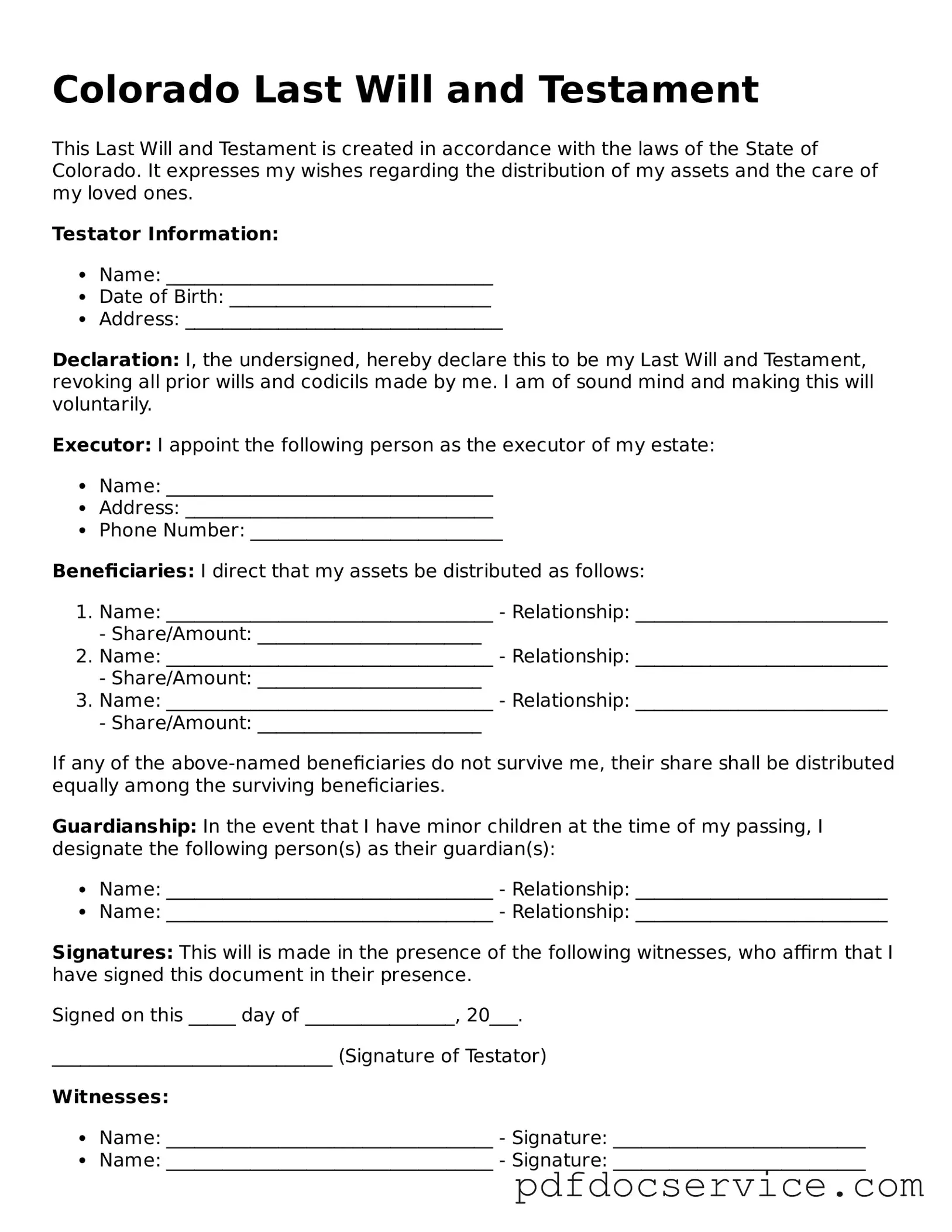What is a Last Will and Testament?
A Last Will and Testament is a legal document that outlines how a person's assets and affairs should be handled after their death. It allows individuals to specify who will inherit their property, appoint guardians for minor children, and designate an executor to manage the estate. In Colorado, having a will is essential for ensuring that your wishes are honored and can help prevent disputes among surviving family members.
Why should I create a Last Will and Testament in Colorado?
Creating a Last Will and Testament in Colorado is crucial for several reasons:
-
It allows you to determine how your assets will be distributed.
-
You can appoint a guardian for your minor children, ensuring they are cared for by someone you trust.
-
A will can simplify the probate process, making it easier for your loved ones to manage your estate.
-
It can help minimize family disputes by clearly outlining your wishes.
Who can create a Last Will and Testament in Colorado?
In Colorado, any individual who is at least 18 years old and of sound mind can create a Last Will and Testament. It is important that the person understands the nature of their decisions and is able to express their wishes clearly. Additionally, the will must be signed and witnessed according to Colorado law to be considered valid.
What are the requirements for a valid Last Will and Testament in Colorado?
To ensure that a Last Will and Testament is valid in Colorado, the following requirements must be met:
-
The testator (the person creating the will) must be at least 18 years old.
-
The will must be in writing, either typed or handwritten.
-
The testator must sign the will at the end.
-
At least two witnesses must sign the will, attesting that the testator was of sound mind and signed willingly.
Can I change my Last Will and Testament after it has been created?
Yes, you can change your Last Will and Testament at any time while you are still alive. This is often done through a process called a codicil, which is an amendment to the original will. Alternatively, you can create a new will that revokes the previous one. It’s important to follow the same legal requirements for signing and witnessing when making changes to ensure the will remains valid.
What happens if I die without a Last Will and Testament in Colorado?
If you pass away without a will, you are said to have died "intestate." In this case, Colorado's intestacy laws will determine how your assets are distributed. Generally, your estate will be divided among your closest relatives, such as your spouse and children. However, this distribution may not align with your wishes, leading to potential disputes among family members.
How do I ensure my Last Will and Testament is executed properly?
To ensure that your Last Will and Testament is executed properly, consider the following steps:
-
Choose a reliable executor who is willing to take on the responsibility.
-
Store the will in a safe place and inform your executor of its location.
-
Review and update your will periodically, especially after major life events such as marriage, divorce, or the birth of a child.
-
Consult with a legal professional if you have complex assets or family dynamics.
Can I write my Last Will and Testament by hand?
Yes, you can write a handwritten will, also known as a holographic will, in Colorado. However, it must still meet the requirements of being signed by you. While handwritten wills can be valid, they may lead to complications during the probate process. It's often advisable to use a formal template or consult a legal professional to ensure that your wishes are clearly articulated and legally binding.

